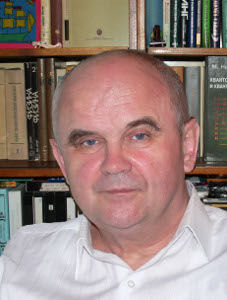
Aleksandr I. Sokolov
(05.09.1945 - 15.03.2021)
Professor
Alexander Ivanovich Sokolov was born on September 5, 1945 in Leningrad. In 1962, he graduated with a gold medal from the secondary school No. 3 of the Vsevolozhsk district of the Leningrad region and entered the Leningrad Electrotechnical Institute (LETI) at the Radio Engineering Department, which trained engineering personnel for the radio-electronic industry. In the second year of his study at LETI, Aleksandr Ivanovich became seriously interested in theoretical physics. Having decided that physics is his vocation, he made an attempt to transfer to the Physics Department of Leningrad University. The attempt, however, was unsuccessful, for the rector of LETI flatly refused to release a brilliant student, a Lenin stipend fellow. Alexander Ivanovich continued his studies at the Radio Engineering Department of LETI and graduated with honors in 1969. After graduation, he was admitted to the graduate school of LETI, and in 1972 he got his PhD upon defense of a thesis entitled “Acousto-thermal effect, acoustoelectric effect and nonlinear sound absorption in hydrodynamic area”. His PhD adviser was Professor O. G. Vendik, but Alexander Ivanovich formulated the topic and performed the research on his own. The thesis was assigned to a Physics speciality, namely, "Physics of dielectrics and semiconductors", and A.I. Sokolov was awarded the PhD in Physics & Mathematics rather than in technical sciences. Beginning 1968, Aleksandr Ivanovich regularly attended seminars at the Ioffe Physical-Technical Institute, where in 1971, while still a graduate student, he gave a talk based on the results of his thesis. After successful graduation, A.I. Sokolov was offered a junior researcher position at the Department of Electronic Ion and Vacuum Technology of LETI. In 1976, he was promoted to the position of senior researcher in theoretical and mathematical physics, and in 1979 he became an Associate Professor.
In the early 1970s, the future Nobel laureate Kenneth Wilson visited Moscow and delivered a lecture. Alexander Ivanovich attended that lecture. Wilson's revolutionary approach to the study of second-order phase transitions changed dramatically the common understanding of the role played by the scale invariance in systems at critical points. These complex and difficult to understand at that time ideas had a strong impression on Alexander Ivanovich. They also had a huge impact on his further scientific activities, which turned out to be entirely devoted to the study of critical phenomena using various methods of the renormalization group. In 1985 at the Ioffe Physical-Technical Institute A. I. Sokolov defended his Doctor of Science thesis on the topic “Renormalization group, critical phenomena and state diagrams of anisotropic systems”, and in 1987 he was elected a full professor at LETI. Working in this field in the following years, he managed to obtain a number of record results, which made it possible to describe the critical behavior of a wide range of superconducting, superfluid, magnetically ordered physical systems.
In the early 2000s, Alexander Ivanovich worked for some time abroad, first at the Higher Normal School of Pisa and later in Lausanne, where, together with his colleagues, he obtained brilliant results in the framework of the renormalization group approach for various universality classes describing cubic and chiral magnets in the real physical space.
In 2011, Alexander Ivanovich Sokolov was elected to the professor position at the Quantum Mechanics Division of the Physics Department, St. Petersburg State University. Thus years later after the unsuccessful attempt of an 18-year-old student, Alexander Ivanovich came to St. Petersburg University as a professor. He took it as a reward for his dedication to his work and love of quantum mechanics. During the last ten years of his life, he worked very fruitfully in his field: together with his colleagues, he managed to obtain high-precision values for the higher dimensionless coupling constants of the three-dimensional Ising model, for the critical exponents of superfluid helium-4, and other physical quantities using the pseudo-epsilon expansion method. Shortly before the untimely death of Alexander Ivanovich, a research team under his leadership was able to calculate the epsilon expansions for cubic and chiral models of critical statics.
A.I. Sokolov was widely involved in expert activities, over the years being a reviewer in various Russian and international journals, including such prestigious publications as “Solid State Physics”, “Physical Review”, “Physica”, “European Physical Journal”, "Theoretical and Mathematical Physics", etc. Alexander Ivanovich was a member of the independent Corps of Experts, a member of the editorial board of the journal “Symmetry”, and served on the advisory board of the journal “Fullerene Science and Technology”. In addition, he regularly took part in the work of the dissertation councils of the LETI and Ioffe Physical-Technical Institute. Alexander Ivanovich supervised 8 PhD students who successfully defended their theses.
Alexander Ivanovich was a brilliant lecturer. For many years of work, he prepared and organized lecture courses in various areas, indicating his excellent education and broad physical outlook. At different periods of his career, he taught courses on collective phenomena in solids, quantum mechanics, solid state physics, critical phenomena in anisotropic systems, modern problems of quantum physics, statistical physics, physical foundations of electronic technology, physics and optics of photoenergy materials, phase transitions, superconductivity, physics of nanosystems. His achievements in teaching were repeatedly awarded with honorary titles: “The best lecturer of LETI”, “Soros professor”, “Professor-2002”, “Professor-2003”, “Professor-2004”, “Honorary worker of higher professional education” and much more. Being a professor at St. Petersburg State University, he was awarded the Physics Department Prize for Pedagogical Excellence.
Aleksanlr Ivanovich Sokolov had interests not only in the field of his professional activity. He was a versatile creative person, played the piano perfectly (as he himself said, “my fingers play when my soul sings”), loved poetry and painting. When communicating with the people, he demonstrated the ability to conduct a conversation on a variety of, and not only scientific, topics. He was a man of high moral culture, intelligent, polite, tactful, always attentive to the people around him. The good memory of Alexander Ivanovich Sokolov will forever remain in our hearts.